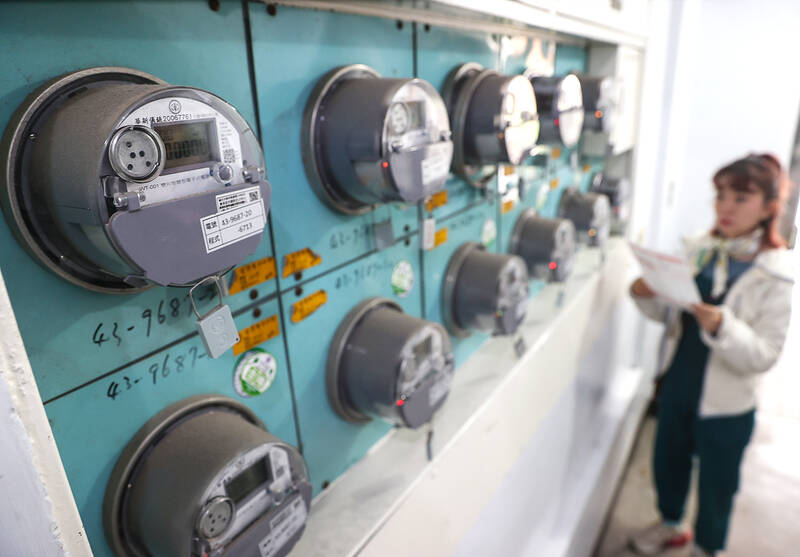Taiwan’s economic activity last month continued to gain support from inventory replenishment demand and rush orders ahead of the US government’s new tariffs, an electricity consumption survey by the Taiwan Research Institute (台灣綜合研究院) showed yesterday.
The Electricity Prosperity Index (EPI) compiled by the New Taipei City-based institute rose 0.15 percent last month from a year earlier, with overall electricity consumption signaling a booming “yellow-red” light for the 11th straight month, the institute said in a statement.
Since US President Donald Trump took office in January, he has announced a number of tariffs, including “reciprocal” tariffs on most trading partners, which have prompted global companies to replenish inventory and accelerate shipments before the tariffs officially take effect, the institute said.

Photo: CNA
“Taiwan’s semiconductor and electronics industries continue to benefit from the booming artificial intelligence [AI] development, which coupled with a surge in rush orders since early March, has driven production lines to operate at full capacity and supported the nation’s economic growth,” it said.
As a result, Taiwan’s economy likely expanded 3 percent year-on-year last month and 3.1 percent in the first quarter, the institute said.
The institute uses the EPI to gauge the health of the nation’s manufacturing and service sectors.
Last month, use of high-voltage power increased 1.49 percent year-on-year, with demand from the manufacturing sector rising 1.69 percent, while service sector demand grew 0.37 percent, it said.
Power consumption by semiconductor firms last month rose 9.46 percent from a year earlier on strong demand for AI and high-performance computing applications, while electricity consumption by suppliers of computers, electronic goods and optical products grew 10.87 percent, as the global AI server market is thriving and looking to expand further going forward, the institute said.
However, chemical material producers saw power consumption decline 3.22 percent annually last month due to rising competition from foreign peers and global overcapacity, it said.
Suppliers of steel products were also affected by the US tariffs, as well as pricing competition from Chinese and Southeast Asian rivals, with their electricity use declining 8 percent last month compared with the same period last year, it added.
Overall, the arrival of recent rush orders highlights not only Taiwan’s strategic role in the global technology supply chain, but also the risks brought about by the uncertainty of the US tariff policy, which warrants further observation, the institute said.

Real estate agent and property developer JSL Construction & Development Co (愛山林) led the average compensation rankings among companies listed on the Taiwan Stock Exchange (TWSE) last year, while contract chipmaker Taiwan Semiconductor Manufacturing Co (TSMC, 台積電) finished 14th. JSL Construction paid its employees total average compensation of NT$4.78 million (US$159,701), down 13.5 percent from a year earlier, but still ahead of the most profitable listed tech giants, including TSMC, TWSE data showed. Last year, the average compensation (which includes salary, overtime, bonuses and allowances) paid by TSMC rose 21.6 percent to reach about NT$3.33 million, lifting its ranking by 10 notches

Popular vape brands such as Geek Bar might get more expensive in the US — if you can find them at all. Shipments of vapes from China to the US ground to a near halt last month from a year ago, official data showed, hit by US President Donald Trump’s tariffs and a crackdown on unauthorized e-cigarettes in the world’s biggest market for smoking alternatives. That includes Geek Bar, a brand of flavored vapes that is not authorized to sell in the US, but which had been widely available due to porous import controls. One retailer, who asked not to be named, because

SEASONAL WEAKNESS: The combined revenue of the top 10 foundries fell 5.4%, but rush orders and China’s subsidies partially offset slowing demand Taiwan Semiconductor Manufacturing Co (TSMC, 台積電) further solidified its dominance in the global wafer foundry business in the first quarter of this year, remaining far ahead of its closest rival, Samsung Electronics Co, TrendForce Corp (集邦科技) said yesterday. TSMC posted US$25.52 billion in sales in the January-to-March period, down 5 percent from the previous quarter, but its market share rose from 67.1 percent the previous quarter to 67.6 percent, TrendForce said in a report. While smartphone-related wafer shipments declined in the first quarter due to seasonal factors, solid demand for artificial intelligence (AI) and high-performance computing (HPC) devices and urgent TV-related orders

MINERAL DIPLOMACY: The Chinese commerce ministry said it approved applications for the export of rare earths in a move that could help ease US-China trade tensions Chinese Vice Premier He Lifeng (何立峰) is today to meet a US delegation for talks in the UK, Beijing announced on Saturday amid a fragile truce in the trade dispute between the two powers. He is to visit the UK from yesterday to Friday at the invitation of the British government, the Chinese Ministry of Foreign Affairs said in a statement. He and US representatives are to cochair the first meeting of the US-China economic and trade consultation mechanism, it said. US President Donald Trump on Friday announced that a new round of trade talks with China would start in London beginning today,